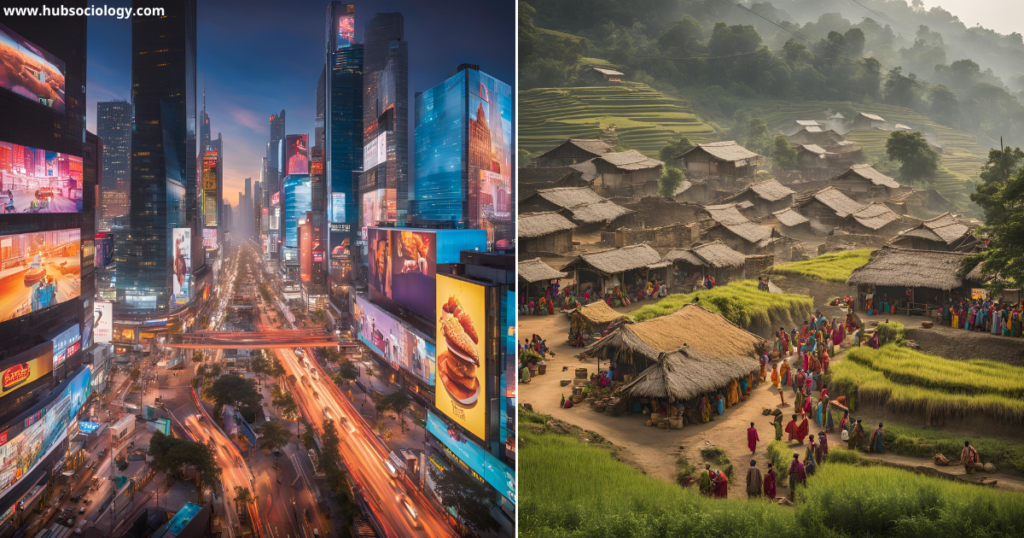Introduction on Westernization and Social Change

India, a land of diverse cultures, traditions, and histories, has undergone significant social transformations over the centuries. One of the most profound influences on Indian society in the modern era has been the process of westernization. Westernization, as a sociological concept, refers to the adoption of Western cultural, economic, and political practices by non-Western societies. In the Indian context, Westernization and Social Change has been a complex and multifaceted process, deeply intertwined with colonialism, globalization, and modernization. This article explores the sociological dimensions of Westernization and Social Change in India, examining its effects on family structures, education, gender roles, and cultural practices.
Historical Context of Westernization and Social Change in India
The roots of Westernization and Social Change in India can be traced back to the colonial period, particularly the British Raj, which lasted from 1858 to 1947. British colonial rule introduced Western education, legal systems, and administrative practices, which had a profound impact on Indian society. The establishment of English-medium schools, universities, and the introduction of Western legal codes were instrumental in disseminating Western ideas and values among the Indian elite.
The colonial encounter also led to a cultural exchange, albeit an unequal one, where Western ideas of rationality, individualism, and scientific progress began to permeate Indian society. This period saw the emergence of a new class of Western-educated Indians who became the torchbearers of social reform movements. Figures like Raja Ram Mohan Roy, Swami Vivekananda, and Mahatma Gandhi were deeply influenced by Western thought, even as they sought to reform and revitalize Indian traditions.
Table of Contents
Westernization and Modernization
Westernization in India is often closely associated with modernization. Modernization theory, a prominent sociological perspective, posits that societies evolve from traditional to modern forms through processes such as industrialization, urbanization, and the spread of education. Westernization, in this context, is seen as a driver of modernization, bringing about social change by introducing new ideas, technologies, and institutions.

In post-independence India, the process of westernization accelerated with the adoption of a democratic political system, a market-oriented economy, and a commitment to scientific and technological advancement. The Indian government, under the leadership of Jawaharlal Nehru, embraced a vision of a modern, secular, and industrialized nation, drawing heavily on Western models of development.
However, the relationship between westernization and modernization in India is not straightforward. While westernization has contributed to the modernization of Indian society, it has also led to tensions and contradictions. The adoption of Western values and practices has sometimes clashed with traditional Indian norms, leading to a complex interplay between the old and the new.
Westernization and Social Change Impact on Family Structures
One of the most significant areas of social change brought about by westernization in India is the transformation of family structures. Traditionally, Indian society has been characterized by joint family systems, where multiple generations live together under one roof, sharing resources and responsibilities. The joint family system has been a cornerstone of Indian social life, providing a support network for its members and reinforcing traditional values.
However, westernization has contributed to the gradual erosion of the joint family system, particularly in urban areas. The influence of Western ideals of individualism and nuclear family structures has led to a rise in the number of nuclear families, where only parents and their children live together. This shift has been driven by factors such as urbanization, increased mobility, and the pursuit of education and employment opportunities in cities.
The decline of the joint family system has had both positive and negative consequences. On the one hand, it has allowed for greater individual autonomy and freedom, particularly for women, who are no longer bound by the strict hierarchies of joint family life. On the other hand, it has led to the fragmentation of social support networks, leaving individuals more isolated and vulnerable in times of crisis.
Education and the Spread of Western Ideas
Education has been a key vehicle for the spread of Western ideas in India. The introduction of English-medium education during the colonial period created a class of Western-educated Indians who became the intermediaries between the colonial rulers and the Indian masses. This class played a crucial role in the Indian independence movement and in shaping the modern Indian state.

In post-independence India, education has continued to be a powerful force for social change. The expansion of higher education, particularly in science, technology, and management, has created a new generation of Indians who are deeply influenced by Western ideas and values. This has led to the emergence of a globalized Indian middle class, which is increasingly disconnected from traditional Indian cultural practices.
However, the spread of Western education has also led to a cultural divide in Indian society. While the urban, educated elite have embraced Western values and lifestyles, large sections of the population, particularly in rural areas, remain rooted in traditional ways of life. This has created a tension between the modern and the traditional, with the educated elite often being accused of being out of touch with the realities of rural India.
Changing Gender Roles Because of Westernization and Social Change
Westernization has had a profound impact on gender roles in India. Traditional Indian society has been characterized by patriarchal norms, where women are expected to conform to strict gender roles and are often confined to the domestic sphere. However, the influence of Western ideas of gender equality and women’s rights has led to significant changes in the status of women in India.
The women’s movement in India, which has its roots in the colonial period, has been deeply influenced by Western feminist thought. The spread of education and the entry of women into the workforce have challenged traditional gender roles and have led to greater gender equality. Women in India today are increasingly asserting their rights and demanding equal opportunities in all spheres of life.
However, the process of change has been uneven and fraught with challenges. While urban, educated women have made significant strides in terms of education and employment, women in rural areas continue to face discrimination and oppression. The persistence of practices such as dowry, child marriage, and gender-based violence highlights the deep-rooted nature of patriarchal norms in Indian society.
Cultural Practices and Identity Because of Westernization and Social Change
Westernization has also had a significant impact on cultural practices and identity in India. The influence of Western media, particularly television and cinema, has led to the adoption of Western lifestyles and consumption patterns among the Indian middle class. This has resulted in a homogenization of culture, with traditional Indian practices being increasingly replaced by Western ones.
For example, the celebration of Western festivals such as Valentine’s Day and Halloween has become increasingly popular in urban India, often at the expense of traditional Indian festivals. Similarly, Western fashion, food, and entertainment have become integral parts of urban Indian life, leading to a dilution of traditional cultural practices.
However, the process of cultural change is not one-sided. Indian society has also shown a remarkable capacity for adaptation and resistance. The rise of cultural nationalism and the resurgence of traditional practices in recent years can be seen as a response to the perceived threat of Western cultural imperialism. Movements such as the promotion of yoga, Ayurveda, and traditional Indian attire reflect a desire to reclaim and preserve Indian cultural identity in the face of Westernization.
Conclusion of Westernization and Social Change
Westernization has been a powerful force for social change in India, shaping the country’s social, economic, and cultural landscape in profound ways. The process of westernization has brought about significant transformations in family structures, education, gender roles, and cultural practices, contributing to the modernization of Indian society.

However, the impact of westernization has been complex and multifaceted, leading to both positive and negative outcomes. While it has brought about greater individual freedom, gender equality, and economic development, it has also led to the erosion of traditional values, cultural practices, and social support networks.
As India continues to navigate the challenges of globalization and modernization, it is essential to strike a balance between embracing the benefits of westernization and preserving the rich cultural heritage that defines Indian society. The process of social change in India is ongoing, and the interplay between tradition and modernity will continue to shape the country’s future in the years to come.
Topic Related Questions on Westernization and Social Change
5 Marks Questions (Short Answer) on Westernization and Social Change
- Define westernization and distinguish it from modernization.
- Focus: Clarify M.N. Srinivas’ concept of westernization vs. modernization theory.
- How did British colonialism act as a catalyst for westernization in India?
- Focus: Role of English education, legal systems, and administrative reforms.
- Explain the impact of westernization on India’s joint family system.
- Focus: Shift from joint to nuclear families, individualism, and urban migration.
- What role did Western-educated elites play in India’s social reform movements?
- Focus: Raja Ram Mohan Roy, Ishwar Chandra Vidyasagar, and women’s education.
- How has westernization influenced gender roles in urban India?
- Focus: Women’s workforce participation, education, and challenges to patriarchy.
10 Marks Questions (Detailed Answer) on Westernization and Social Change
- Critically analyze the relationship between westernization and cultural homogenization in India.
- Focus: Western media, consumerism, and erosion of regional traditions (e.g., festivals, attire).
- Discuss the role of education in spreading Western ideas in post-independence India.
- Focus: English-medium schools, STEM education, and the rise of the globalized middle class.
- Examine the paradox of westernization: How has it both empowered and marginalized sections of Indian society?
- Focus: Urban-rural divide, caste dynamics, and access to opportunities.
- Evaluate the impact of westernization on India’s traditional caste system.
- Focus: Decline of caste-based occupations vs. persistence of caste identities in politics.
- “Westernization has redefined Indian feminism.” Comment with sociological examples.
- Focus: Influence of Western feminist movements vs. indigenous struggles (e.g., #MeToo).
15 Marks Questions (Essay-Type) on Westernization and Social Change
- “Westernization is a double-edged sword for Indian society.” Critically evaluate this statement with reference to social change.
- Focus: Balance between progress (secularism, science) and cultural erosion (family values, traditions).
- Trace the historical trajectory of westernization in India and its impact on contemporary youth culture.
- Focus: Colonial legacy, globalization, and trends like dating culture, fast food, and digital lifestyles.
- How has westernization transformed India’s political and economic institutions? Discuss with examples.
- Focus: Adoption of democracy, capitalism, and bureaucracy vs. challenges like corruption.
- Analyze the resistance to westernization in India through movements like Swadeshi and cultural nationalism.
- Focus: RSS, Hindutva, revival of Ayurveda/yoga, and rejection of Western consumerism.
- “Westernization and Sanskritization are competing processes in India’s social change.” Discuss.
- Focus: M.N. Srinivas’ theories, caste mobility, and coexistence of tradition/modernity.

1 thought on “Westernization and Social Change in India: A Sociological Perspective”